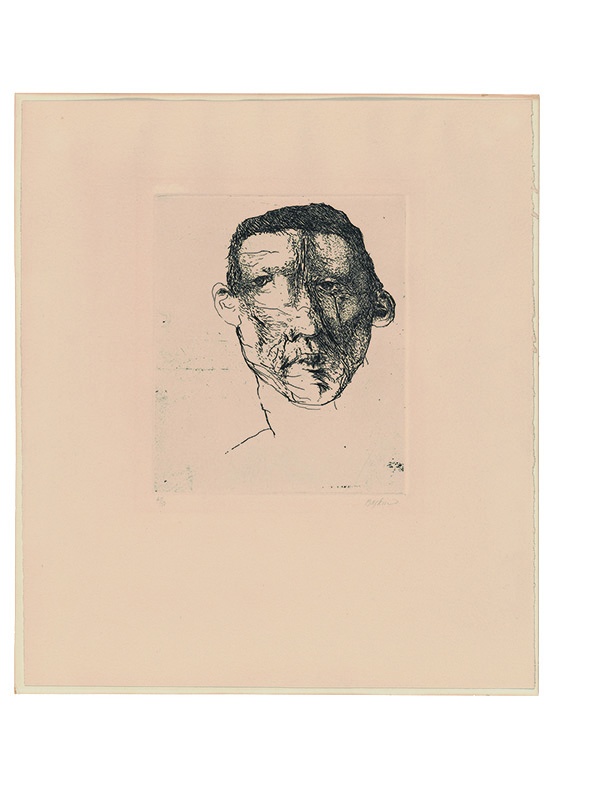Historically speaking, the “Judenboycott” helped pave the way for mass extermination. The most recent incarnation of a “boycott of the Jews” is utterly unempathetic in how it disregards the Jewish Holocaust experience. And that is where the boycott strategy proposed by the anti-Israel BDS campaign, which has recruited a growing number of supporters, especially in the world of art and culture, crosses a red line. It is an ethical failure with which those supporters need to be confronted, Aram Lintzel writes. What is especially striking is the destructiveness of BDS’s demands: its exponents strenuously avoid any explicit commitment to the two-state solution. Legitimate expressions of solidarity with Palestinian concerns instead devolve into systematic delegitimization of the Jewish state. So where does justifiable “criticism of Israel” end and (anti-Zionist) anti-Semitism begin? Lintzel proposes possible ways out of an aporetic constellation.
It was in 2019 that the movement to boycott Israel known as Boycott, Divestment and Sanctions (BDS) became the focus of increased attention. A number of disputes that year, including the controversy around supposedly BDS-affiliated figures working at the Jewish Museum in Berlin, which peaked with the resignation of the museum’s director, Peter Schäfer, along with a motion by the German Parliament to have BDS’ “modes of argument and methods” classified as anti-Semitic, and the decision to award the Nelly Sachs Prize to BDS supporter Kamila Shamsie, all brought similar turmoil and publicity with them. Defenders of the campaign demanded a “right to boycott” in the name of free speech, as stated in the title of one of many published statements, even claiming that the actions of BDS critics amounted to a “new McCarthyism.” Many messages of solidarity saw BDS portrayed as a human rights movement whose goals are pursued not only in line with international law but also – and this, it was claimed, should be acknowledged – without violence.
The BDS campaign’s approach to the desperate situation faced by many Palestinians is naturally preferable to the terrorism of the Intifada or Hamas, but it can only be called peaceful if one has a fairly narrow definition of violence. It relies on anti-Israeli hate speech, bullying, and psychological terror against Israelis and those people who play concerts, do business, or want to give lectures in the country. I myself was witness to totalitarian braying and other threatening gestures two years ago, during a discussion with the Israeli author Lizzie Doron. The talk was held as part of the Pop-Kultur music festival in Berlin and had gained the attention of BDS due to a small subsidy provided to it by the Israeli embassy. The fact that Doron herself maintains a highly critical stance toward the politics of the occupation made no difference at all to those who disrupted the event; BDS campaigners indiscriminately hold all Israelis collectively responsible for the politics of their country. The political scientist Samuel Salzborn writes that “they are all punished for something that has nothing to do with their own behavior or person”; he therefore speaks of a “völkisch understanding of criminal law.”
Nebulous Demands
The political scientist Florian Markl claims that the BDS movement’s hour of birth was during the World Conference against Racism, which was organized by numerous NGOs and held in Durban in 2001. Its closing statement described Israel as a “racist apartheid state” and accused the country of genocide. In July 2005, a coalition of over 170 Palestinian NGOs published its first call for sanctions, stating: “Inspired by the struggle of South Africans against apartheid and in the spirit of international solidarity, moral consistency and resistance to injustice and oppression, We, representatives of Palestinian civil society, call upon international civil society organizations and people of conscience all over the world to impose broad boycotts and implement divestment initiatives against Israel similar to those applied to South Africa in the apartheid era.” Above all, it was the country’s economic, cultural, and scientific activities that were to be subject to – direct quote – “punitive measures,” but in the years that followed, far fewer “people of conscience” were found in global corporations than in cultural and academic circles. Name-dropping abounded in the movement’s PR, with prominent supporters of the movement, such as the gender theorist Judith Butler or the ambient musician Brian Eno, invoked as pillars of integrity.
BDS has a particularly high number of supporters in the UK – “Whenever there’s a BDS petition, British artists are there to sign up to it,” the writer Sibylle Berg once stated. This is perhaps not least due to the fact that support for the Anti-apartheid movement was also particularly high in the UK. Use of the term “apartheid” provided the movement with a battle cry; one which, in addition to its moral appeal, also had the secondary effect of supplying those activists who were seeking new fields of action with a convenient enemy. Israel, the BDS movement’s narrative suggests, is nothing more than a recasting of the politics of apartheid, and can therefore function as a code word for racism, colonialism, oppression, etc.
The 2005 call for sanctions named three goals: pressuring Israel into “[e]nding its occupation and colonization of all Arab lands and dismantling the Wall; recognizing the fundamental rights of the Arab-Palestinian citizens of Israel to full equality; and respecting, protecting and promoting the rights of Palestinian refugees to return to their homes and properties as stipulated in UN resolution 194.” But while the anti-apartheid movement articulated clear goals (“Free Nelson Mandela!” “Stop Apartheid Now!”), BDS’ demands are noticeably nebulous. It remains unclear what is meant by “all Arab lands”; those affected by the foundation of the state in Israel in 1948, or the territory “occupied” by the country after the Six-Day War in 1967? It also fails to provide an answer to the question of how the scenario of around five million Palestinians who today have the status of refugees returning to current-day Israel should be imagined. In reality, this would mean the end of Israel as both a Jewish state and a democratic one. While those BDS sympathizers who write open letters in support of the movement may of course not necessarily all be hard-nosed BDS supporters, they nonetheless show it remarkable generosity in overlooking the fact that it offers no format for any peaceful settlement to the conflict that would afford Israel an equal right to exist.
And yet this ambiguity is entirely deliberate in rhetorical terms, as Ulrich Gutmair pointed out in the Tageszeitung: “It helps bring left-wing liberals who don’t make the effort to look closely at the issue over to your side.” Depending on the reading, the BDS agenda is compatible either with those pragmatic forces that demand Israel retreat from the territories it occupied in 1967 or with radical positions that want to see the entire country and Middle East free of any Jewish state. This fog around the movement’s rhetoric allows each call for action to be adapted according to its individual context and audience. In their paper “The Case for a Cultural Boycott of Israel,” for example, the group Artists for Palestine UK claims that BDS demands Israel “withdraw from all the territory it has occupied since 1967, including East Jerusalem, and remove its illegal settlements.” It is certainly not formulated so clearly, moderately, and acceptably in the campaign’s original call for action. But no matter in which direction BDS messages are directed, they always take a noticeably selective approach to international law, which affords the right of self-determination not only to the Palestinians, but also and equally to the Jewish people. In any case, no explicit recognition of the two-state solution can be found anywhere in the call made by the BDS.
Jewish Audacity
Ever since the previously mentioned parliamentary proposal, debate has raged over whether BDS can be called anti-Semitic or not. Where does legitimate “criticism of Israel” end and (anti-Zionist) anti-Semitism begin? Many critics of BDS refer to the “3-D test of anti-Semitism.” This was developed in 2003 by Natan Scharanski, at that time the Israeli minister responsible for social issues, before later being adopted by the European Monitoring Centre on Racism and Xenophobia (EUMC). The aim of the test is to allow anti-Semitism camouflaged as “criticism of Israel” to be distinguished from legitimate criticism of Israeli governmental policy. It specifies three criteria: if a statement demonizes, delegitimizes, or applies a double standard to Israel, it is anti-Semitic. The “three d’s” are criticized above all for supposedly having served to “blur the boundaries” of the definition of anti-Semitism, and with this help immunize the right-wing Israeli government against criticism from the Left. One site of bitter dispute around the meaning of the test was its inclusion of the concept of “Israel-related anti-Semitism.” It is claimed that this connection makes all criticism of Israeli realpolitik impossible by effecting a hermeneutics of suspicion that automatically labels any well-intentioned critic an anti-Semite.
It cannot be denied that the Netanyahu government has overstretched its claims of anti-Semitism in its sometimes paranoid battle against left-wing groups and NGOs, holding the Israeli Left collectively responsible for every statement made in the context of BDS and in this way seeking to delegitimize any left-wing criticism of the government’s current settlement policy. Nevertheless, the entirely vague nature of the concept of “Israel-related anti-Semitism” makes it open to abuse, thereby illustrating the soft, mostly inconspicuous transitions between anti-Zionism, hostility to Israel, and anti-Semitism. As formulated by Dan Diner, anti-Semitism has the perfidious quality of being “barely recognizable as a fragment or residue.” The “toxic mistrust” that Judith Butler deplores of BDS critics therefore seems entirely reasonable in heuristic terms.
For “delegitimization” is naturally something other than simple criticism of this or that activity of the Israeli government; it questions Israel’s right to exist, whether openly or between the lines, or ties it up with exorbitant moral preconditions. BDS-related texts are full of assertions in which delegitimization and demonization of Israel amalgamate. In his book Boycott, Divestment, Sanctions: The Global Struggle for Palestinian Rights, Omar Barghouti, a co-founder of BDS and one of its key thinkers, talks of “genocide,” “ethnic cleansing,” “colonialization,” and “fascism.” The accusation of apartheid alone denies the Israeli reality. That there is no “separation of the races” in Israeli schools, on park benches, or on buses, and that Arab parties are represented in the Knesset, is not disputed by BDS. Even ignoring the fact that Barghouti, as a Palestinian living in a racist “apartheid state,” was nonetheless able to study, his caricature of Israel brings to mind Léon Poliakov’s famous bon mot that the country is the “Jew among nations”: a nation-state like many others, but still somehow different. Or as the French rabbi Delphine Horvilleur writes in her book Réflexions sur la question antisémite (Considerations on the question of anti-Semitism), “The Jews are always a bit too similar and a bit too different. They are audacious enough to always either want to assimilate themselves or demand sovereignty; wanting neither to leave nor to stay.” The delegitimizations of the Jewish state that are typical of BDS take a communicative detour, addressing Israel, while actually speaking about the Jews. Horvilleur takes aim at precisely that zone where anti-Semitism and anti-Zionism become indistinguishable from one another when she (admittedly somewhat exaggeratedly) asks: “How can it be that the demand for territorial sovereignty and political or cultural autonomy is seen as justified in the case of every ethnic minority but the Jews?”
The Colonial Evil
BDS is part of a tradition of anti-Zionist anti-imperialism that divides the world into good, oppressed peoples and evil, oppressive elites. While the global Left still expressed solidarity with the state of Shoah-survivors and the socialist lifestyles of the kibbutzim before the Six-Day War, the mood shifted after 1967. From that point on, a binary matrix was projected onto the Middle East, whereby the Jewish state was no longer seen as the legitimate expression of self-determination by a people that had faced centuries of discrimination, but instead as the manifestation of overbearing oppression. The reductionism of BDS activists sees world peace as being contingent on the end of conflict in the Middle East, with Israel the original evil that poisons not only the Middle East, but also the ability of all peoples to live together. “For the world to able to live in peace, it must free itself from the divisiveness that is embodied by the Jews,” Horvilleur writes of this obsession. Again and again one finds elements of Israel-related anti-Semitism in BDS texts: ancient anti-Jewish clichés, stigmatization of the Jews as a “source of contamination,” and the reversal of the roles of perpetrator and victim.
This sees the old fantasy of hidden Jewish “influence” invoked, as when Barghouti names the enemy as “Israel and its well-financed, bullying lobby groups.” He also accuses Israel of clever “branding,” which it uses to sell itself as a liberal, cultured, queer-friendly, and diverse country. The Jews – according to the stereotype – have mastered the art of capitalist manipulation more perfectly and perfidiously than any other group. And so when Barghouti accuses Israel of committing a “slow genocide” in Palestine,” it isn’t hard to recognize the anti-Semitic trope of Jewish insidiousness in his assertion. In the rhetoric of BDS, Jews and Israel are not victims of the Nazis or Islamist terror, but perpetrators whose unparalleled trickery has allowed them to advance to a position of power. But while the equation of Israel with Nazi Germany is achieved through (entirely symptomatic) excesses, as when a campaign against the Eurovision Song Contest being held in Israel saw the ESC logo furnished with an SS rune, the “projection of the Israeli state as a neocolonial superpower” is characteristic of BDS discourse in general. Israel is demonized as a sort of final update of colonialism at every available opportunity; Horvilleur summarizes this as the view that “they [the Jews] once colonized thought, as now they do the earth.”
Just like the use of the term “apartheid,” this “colonial framing” blurs fundamental historical differences. The Jewish colonization of Palestine did not proceed from any colonial “motherland,” but rather from Jews seeking a refuge from anti-Semitic persecution. Particularly with regard to the appeal of BDS in Great Britain, Florian Markl sees the labeling of Israel as a colonial power as indicating an “anti-Semitism of exoneration” that serves to relativize the guilt of one’s own ancestors. But what would a “decolonized” Israel actually look like? Ask Palestinian supporters of BDS in personal conversation how they imagine life alongside a Jewish minority after the return of millions of Palestinians to the “occupied Arab land” and they often paint a picture of a pre-colonial state of nature: Arabs always used to live peacefully alongside Jews. But one only has to read Georges Bensoussan’s book Jews in Arab Countries: The Great Uprooting, which tells of anti-Jewish pogroms in Arab countries before the foundation of Israel, to recognize the historically revisionist nature of this pseudo-idyll.
Humanism without Empathy
The reference to human rights is selective and serves to single Israel out; it is the exception from which nothing is ever allowed to pass. Not only are other occupations and human rights violations across the world ignored, but Hamas is not even asked to cease its rocket attacks on Israel. And if the primary objective really is a better life for Palestinians, why does no one speak out about the inhuman conditions many of them are forced to endure in refugee camps in Arab countries, without being awarded any right of citizenship there?
BDS ignores the understandable need for security on the part of Jews living in Israel when it demands the removal of defensive infrastructure or refers to the wall separating Israel from occupied areas as an “apartheid wall” – as if its construction hadn’t reduced the number of suicide attacks. The real terrorists are the Israelis; the threat from Iran and its protégés Hezbollah and Hamas therefore isn’t an issue in BDS statements. The Israel question is an idée fixe, and this tunnel vision results in a striking lack of empathy with regard to the (post)traumatic state of Jewish identity. In 2017, BDS activists even dared to shout down an event at Berlin’s Humboldt University featuring the 82-year-old Holocaust survivor Deborah Weinstein. The fact that the National Socialist boycott of Jewish businesses was the first step in the regime’s policy of annihilation, and that their calls for boycott could therefore trigger the trauma of the Shoah, is of no concern to BDS. Instead, the unwavering agitation of BDS activists stems from their conviction that they are on the side of universalism and humanism, and their belief that they already know who it is that is sabotaging world peace. They look down from high above on what they perceive as the audacity of Jewish particularism, while their universalism itself openly and ideologically conceals the particularist hostility it holds towards this very same state (and no other). In addition to this comes the fact that many Jews are understandably suspicious of the concept of universal human rights, even if Judith Butler may want to revitalize the tradition of a diasporic Jewish universalism, since it ultimately failed to prevent the persecution and mass murder of their people. And so instead of remaining stuck in the constraints of the anti-Israeli obsession, and making distinctions between friend and foe that only serve to entrench the positions of those involved, it would therefore be expedient to start by resisting the “aporetic constellation between universal and Jewish perceptions,” and against all odds to seek paths out of this dead end. If this is to happen, the political movements leading there – in contrast to the methods of BDS campaigners and their followers – will need to be dialogic, cautious, and scrupulous.
Translation: Ben Caton
Notes




